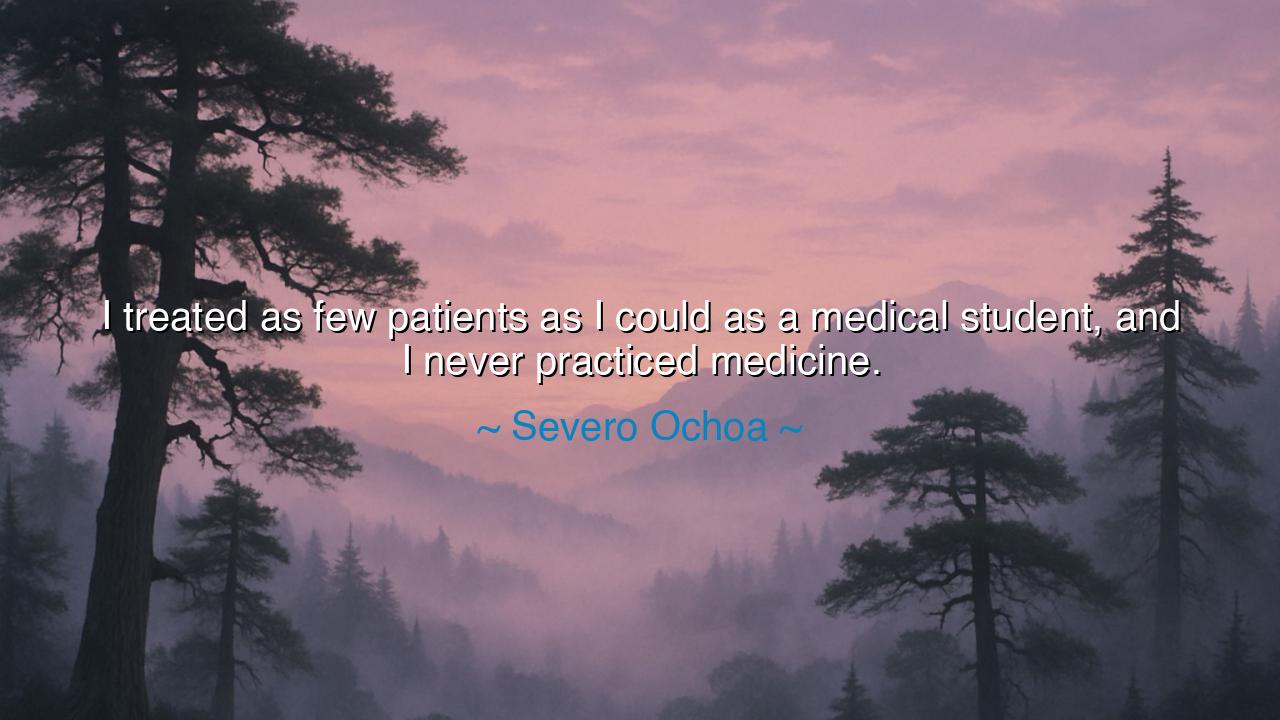
I treated as few patients as I could as a medical student, and I
I treated as few patients as I could as a medical student, and I never practiced medicine.






“I treated as few patients as I could as a medical student, and I never practiced medicine.” Thus spoke Severo Ochoa, the great biochemist, a man who sought not the bedside but the building blocks of life itself. His words, at first glance, seem cold and strange — even irreverent, coming from one trained in the healing arts. But within them lies not rejection, but revelation: the calling of a soul that understood that to serve humanity, one must find one’s true path, even if it leads away from the expectations of others. Ochoa’s confession is not an admission of neglect, but a declaration of purpose — the courage to follow the voice within, even when it leads away from the familiar road.
In the early years of his life, Severo Ochoa studied medicine in Spain, as many of noble mind and heart once did. Yet while others found fulfillment in the touch of healing, Ochoa’s fascination lay deeper — in the very mystery of life’s origin, in the invisible chemistry that animated the cells of the living. The hospital could not contain the vastness of his curiosity. The ailments of men were symptoms; Ochoa wanted to understand the cause of life itself. And so, even as a young student, he avoided the wards and the whispers of the sick, drawn instead to the quiet hum of laboratories, where the language of molecules spoke to him more clearly than the cries of patients. His destiny was not to heal bodies, but to uncover the code of creation — to seek, through science, the key to life’s eternal rhythm.
For this, the world would one day thank him. His work in the field of biochemistry, his discovery of RNA synthesis, and his insights into the mechanisms of genetic translation would illuminate the very foundation of biology. From his research, generations of doctors, scientists, and healers would learn to understand disease at its root, to prevent what once could only be treated. Thus, though Ochoa never practiced medicine in the conventional sense, he became a physician of life itself, healing not the individual but the species, not the body but the knowledge upon which the body’s survival depends.
There is, in his story, an ancient truth — that service takes many forms, and that not all healers wear the same robe. The warrior defends by the sword, the philosopher by the word, the builder by the stone — and each, in his own way, preserves the world. So too did Ochoa preserve it through inquiry, proving that to understand life is to serve it. Many have misunderstood such paths, believing that true compassion requires the immediacy of touch or presence. Yet the pursuit of truth — rigorous, relentless, and often solitary — is also an act of love. For knowledge, when used rightly, is mercy extended across time.
Consider also the story of Hippocrates, the ancient father of medicine. Though famed for his care of the sick, his legacy lies not in the patients he healed but in the principles he left behind — the Hippocratic Oath, the moral foundation of all medical practice. He, too, understood that wisdom preserved is greater than any single act of treatment. In the same way, Ochoa’s discovery became his oath — not written in words but in molecules, not sworn before gods but before the vast and silent temple of nature. His statement, then, is a reminder that impact is not measured by proximity, but by purpose.
And yet, Ochoa’s words also carry a note of humility. In admitting that he “treated as few patients as [he] could,” he did not boast, but acknowledged his limitation. He knew that the art of medicine, noble as it was, did not align with the rhythm of his heart. He respected the craft enough to know that others, more gifted in empathy and bedside care, should carry that mantle. In this humility lies another lesson — that wisdom is not only in knowing what one can do, but in knowing what one cannot. The man who chases every path finds none; the man who walks his true path finds greatness.
So, my children, take this teaching to heart: do not mistake deviation for failure, nor solitude for selfishness. Each soul has its own way of serving life. The doctor heals the sick; the scientist heals ignorance; the teacher heals the mind; the artist heals the heart. What matters is not the form of your work, but the truth of your devotion. Severo Ochoa shows us that purpose is sacred, and that to follow it faithfully — even if misunderstood — is the highest form of service.
Let his life remind you that destiny is not dictated by tradition, but discovered through calling. The world does not need a thousand copies of one virtue; it needs a thousand virtues, each unique, each radiant. Whether you heal through medicine, through thought, through art, or through invention, do it with all your heart. For in the end, as Ochoa’s journey reveals, it is not the path that defines the man — it is the passion with which he walks it.






AAdministratorAdministrator
Welcome, honored guests. Please leave a comment, we will respond soon